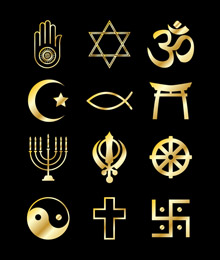Have a Little Faith
June 14, 2012 by Amanda Storey
Filed under Special Features
 When asked where you were on 9-11, your answer will be ready on the tip of your tongue. The memory, no doubt, still swims in your mind, pulsing and stubbornly vivid. But what if you’re asked where God was on the day the Twin Towers fell? Where was goodness? Where was peace? Where was he on the battlegrounds of the world wars, or in the concentration camps of 70 years ago? Is he there in the ghettos that line the dirt roads of Third World countries, or in the home of an abused child? Few know the answers to these questions. The concept of God, of a Higher Power – a symbol of eternal peace, happiness, and fulfillment – contrasts so strikingly with the broken world in which we live in that it’s becoming a terrible challenge to keep faith in our grasp. For many, the idea of having faith seems pointless if you’re serving a faceless God, a God who never seems to appear when he’s needed most. Confronted by the differing faces of religion, many become overwhelmed and surrender to the seemingly
When asked where you were on 9-11, your answer will be ready on the tip of your tongue. The memory, no doubt, still swims in your mind, pulsing and stubbornly vivid. But what if you’re asked where God was on the day the Twin Towers fell? Where was goodness? Where was peace? Where was he on the battlegrounds of the world wars, or in the concentration camps of 70 years ago? Is he there in the ghettos that line the dirt roads of Third World countries, or in the home of an abused child? Few know the answers to these questions. The concept of God, of a Higher Power – a symbol of eternal peace, happiness, and fulfillment – contrasts so strikingly with the broken world in which we live in that it’s becoming a terrible challenge to keep faith in our grasp. For many, the idea of having faith seems pointless if you’re serving a faceless God, a God who never seems to appear when he’s needed most. Confronted by the differing faces of religion, many become overwhelmed and surrender to the seemingly
solid and definite floor of Atheism. Others wander from faith to faith, seeking answers and identity, gathering different pieces of belief here and there but never quite finding fulfillment.
Despite the science that roots against religion, humans can’t deny the restless tug that turns their eyes to the sky.
For those who have soldiered through the confusion and now house a vibrant faith, religion is more than a set of guidelines and “thou-shalt-not’s” – it’s a celebration of the fact that humans don’t only exist as physical beings, but as spiritual ones as well. “There are two sides to our nature,” says Mahindra Tiwary, a Hindu sage at the Toronto Hindu Dharmic Sabha in Etobicoke. “One is physical and the other is super-physical. The super-physical is in the spirit in all of us.” Though Tiwary’s words are rooted in a Hindu perspective, his awareness of the non-physical side of humanity is a knot of truth that connects with all other religions: while flesh, muscle and bone comprise our physical bodies, it’s the soul that makes up our spiritual bodies. The former is nourished with food and drink; the latter is fed with faith.
Perhaps this hidden spiritual body is the source of that mysterious tug. Are we being warned of the starvation occurring from lack of spiritual nourishment – from lack of faith? “Without faith, human beings will be just like animals living in the jungle without rules,” says Aslam Daud, national general secretary for the Ahmadiyya Muslim Jama at Canada. “Society is defined by faith; it gives the definition of the good, the bad, and the evil.”
In light of the world’s current economic and moral struggles, this statement hits harder than ever before. In the midst of a repression, a worldwide obsession with material wealth, and an accelerating thirst for violence, it is clear that humanity has been depriving itself of that spiritual enrichment that is essential for survival. A human needs something to believe in; otherwise, the spiritual body will take ill, so to speak – and the void it leaves will make room for hatred, violence, and immorality. “Revival of religion is needed,” says Daud. “It is a complete way of life – it is a message of peace and tolerance.”
It’s also a continuous reminder of what our priorities in life are, says Rev. Donatello Iocco of St. Clare of Assisi Parish in Woodbridge. “Faith helps society focus on what’s important: God, and our neighbour,” he explains. “It helps us make good and right decisions that can benefit the well-being of society.” And these words don’t stand strictly for the Catholic faith. Countless religions carry their own translations of the Golden Rule: “Treat others the way you wish to be treated”; “think of your neighbour first”; “turn the other cheek”.
This “golden” state of mind stretches from religion to religion, allowing faith communities to take on a family-like feeling bursting with selfless love. When people gather in prayer, worship or meditation, among them blossoms a tightly knit bond that allows for a peaceful environment of genuine care. This is voiced in the words of Rev. Robert Royal of St. Andrew’s Presbyterian Church in Maple. “The Christian mission is characterized by a quote from Jesus in the Bible’s New Testament: ‘A New command I give to you: Love one another,’” he recites. “At St. Andrew’s, reaching out to our community is of utmost importance. When one is looking for friendship and a welcoming church home, we offer them a warm atmosphere of Christian hospitality.” In our society’s rushing, pushing race through the everyday, the haven of spiritual enrichment and care found in church communities such as St. Andrew’s could act as a defibrillator to a faltering soul.
Indeed, one may find that by stepping into a spiritual community – even if just for a few hours – they will leave with an enhanced understanding of morality and a deeper respect for humanity in general. Once coming face to face with the possibility of a Higher Power, and encountering the love-bound community of believers that stands beneath it, one may experience a renewed sense of wholeness they hadn’t known was possible.
Of course, tending to our spiritual halves doesn’t simply result in a polished, Heaven-worthy collection of morals; committing to a string of beliefs is the start of a lifelong journey of learning, improving, and of course, discovering. “It is human nature to want to understand everything,” says Tiwary. “We want to know the how’s and why’s.” While the focus on morality is a large piece of religion’s puzzle, the road to self-discovery is another significant part. Religion helps us to get to know our creator, to cosy up to our purpose in life. “By believing in a higher power, [we can] reflect on who we are and where we came from, why we are here and where we will go when our life on Earth concludes,” continues Tiwary. “A person’s belief in religion can explain a lot of those things that we can’t ourselves. It gives meaning to life and a way of how it began.” Giving some attention to the spiritual body may act as an emotional awakening.
Enriching your faith won’t only open your eyes to a completely different view of life in general, but of your own existence as well. Religion will make you look at yourself in ways you never did before; through spiritual eyes, you will see yourself as a being with a true purpose. “Without faith, everything is mundane,” says Geshe Kelsang Gyatso, founder of the New Kadampa Tradition of Buddhism. “We are blind to anything beyond the ordinary and imperfect world we normally inhabit, and we cannot even imagine that pure, faultless beings, worlds or states of mind exist. Faith is like pure eyes that enable us to see a pure and perfect world beyond the suffering world.”
The contrast among religions may be as striking as day is from night, but every faith speaks words of truth. Spirituality hands us the key to unlocking life’s most rusted secrets, and leads us down the path to discovering what humanity is. It helps us to realize that God, an abundance of goodness and a wealth of purpose, is hidden in each of us. God emerges in glimpses as people let the goodness within them shine. By treating a homeless person to a meal or lacing up for a charity marathon, God is given a face in each of us. He resides in those who take the time to appreciate the intelligent beauty of a butterfly’s wings or the simple fascination of dusk.
God was there on the day the Twin Towers fell. He was crashing through the rubble in the form of a firefighter who was risking her life to save the people buried beneath. He was there handing out care packages to the victims’ families, and volunteering to clear the carnage from the streets. He was the man who ran from the safety of the sidewalk, dropping his suitcase to help a bleeding being onto a stretcher and into an ambulance.
In the middle of this perplexing abyss of belief or non-belief is one undeniable truth represented in all religions: human beings were designed to believe.
Amanda Storey holds to the Christian faith and studied English literature and psychology at Tyndale University College & Seminary in Toronto, Ontario.
The opinions expressed herein do not reflect the opinion of Dolce Publishing Inc. or promote the act of converting. They are simply the opinion of the author.












Comments
Feel free to leave a comment...
and oh, if you want a pic to show with your comment, go get a gravatar!